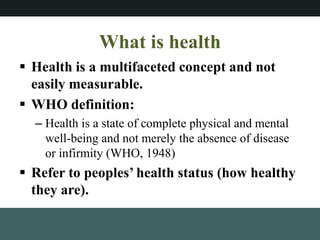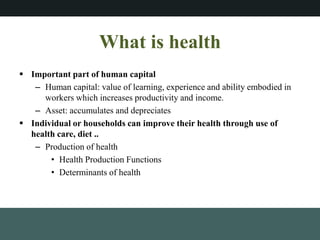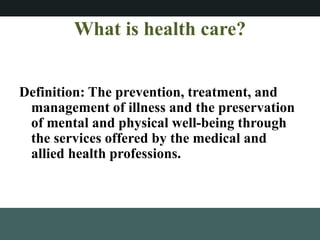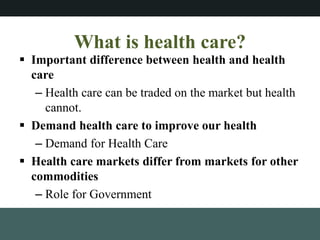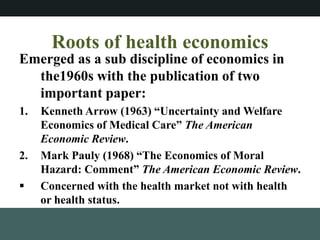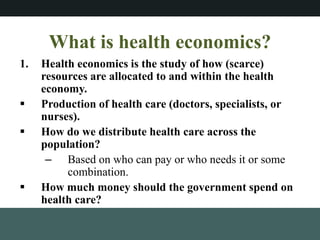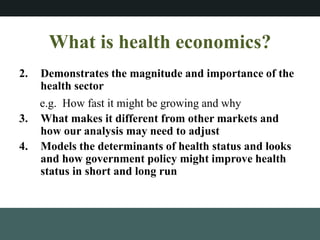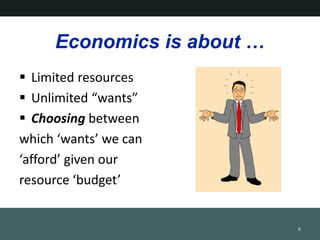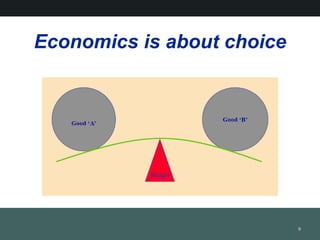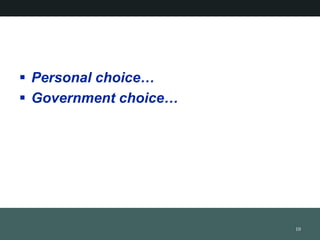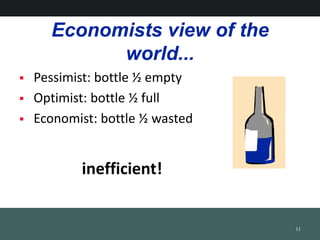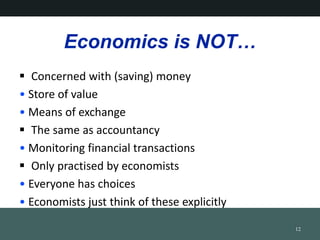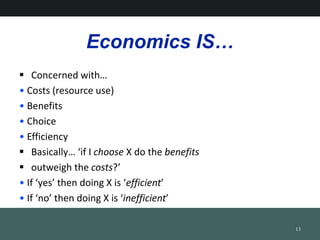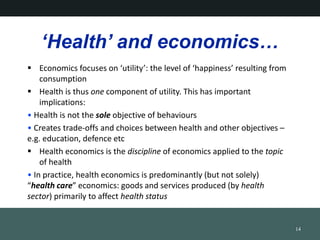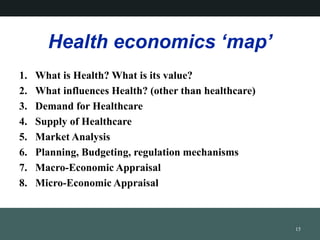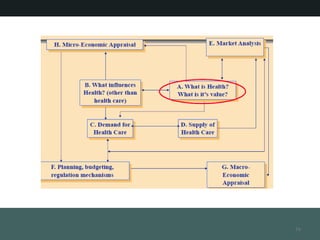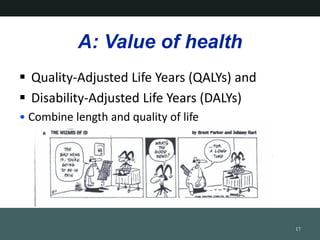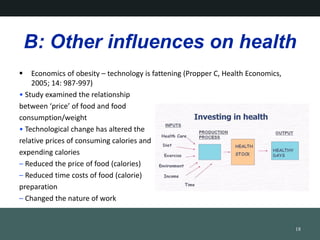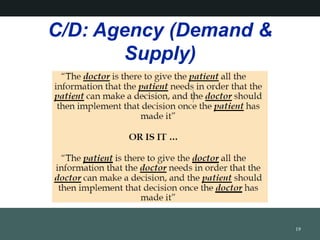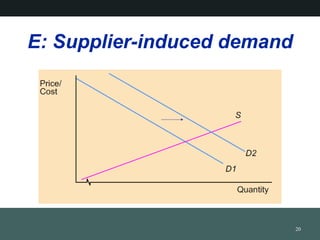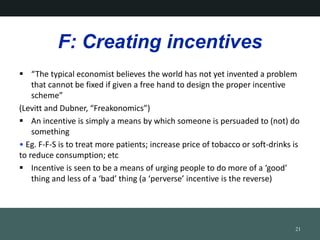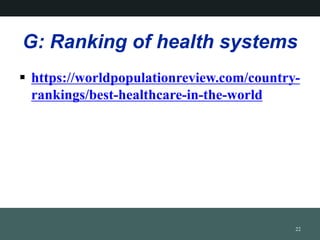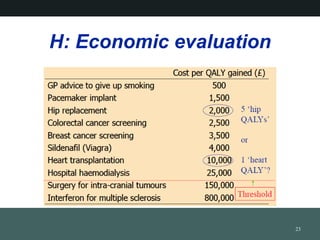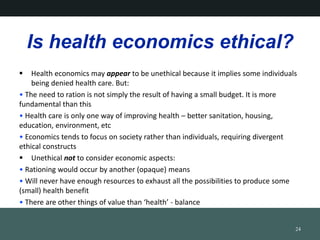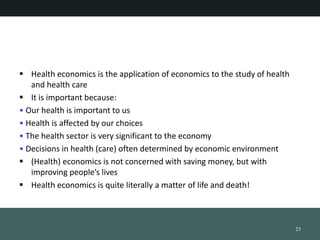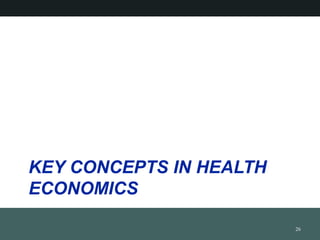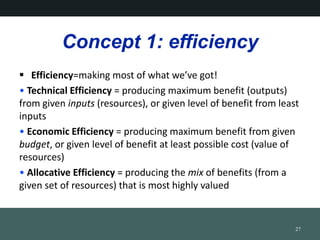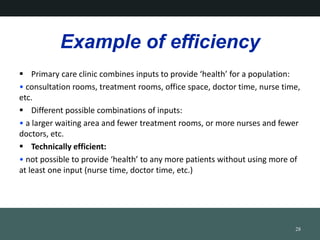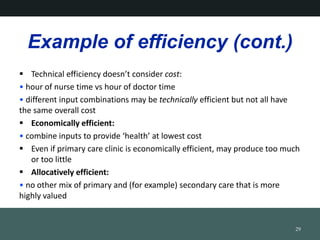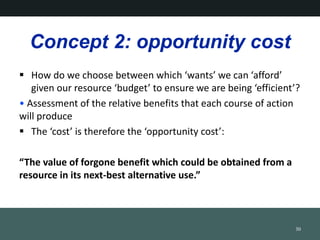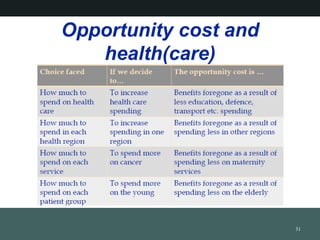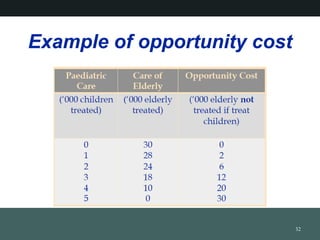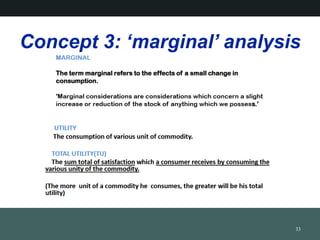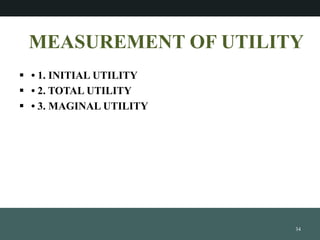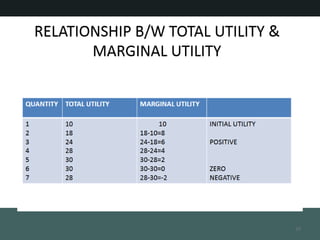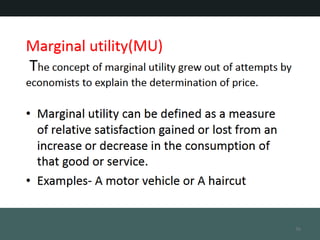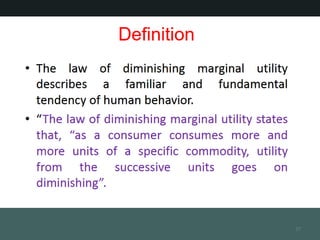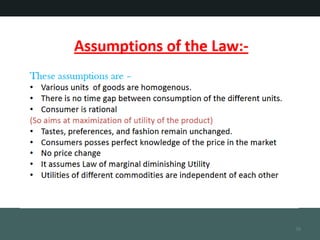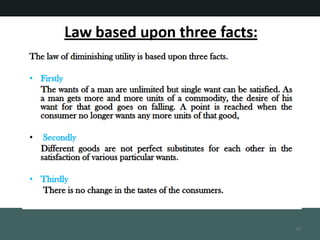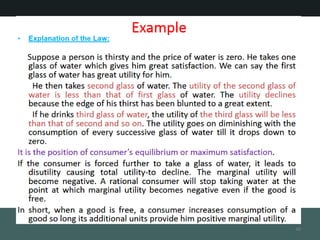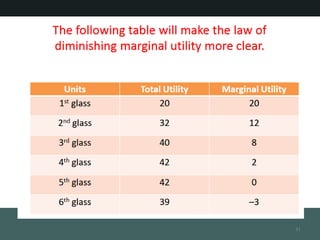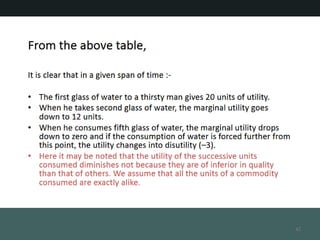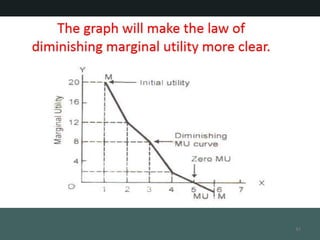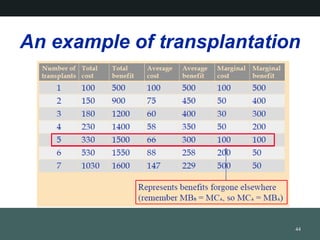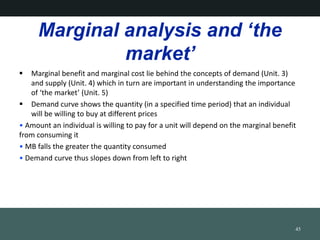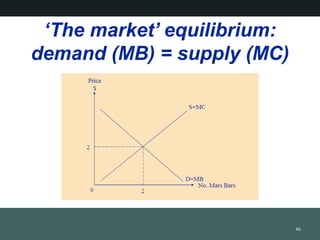"Key Concepts in Health Economics: Understanding Resource Allocation, Policy Evaluation, and Healthcare Efficiency"
- 1. What is health ? Health is a multifaceted concept and not easily measurable. ? WHO definition: ¨C Health is a state of complete physical and mental well-being and not merely the absence of disease or infirmity (WHO, 1948) ? Refer to peoplesˇŻ health status (how healthy they are).
- 2. What is health ? Important part of human capital ¨C Human capital: value of learning, experience and ability embodied in workers which increases productivity and income. ¨C Asset: accumulates and depreciates ? Individual or households can improve their health through use of health care, diet .. ¨C Production of health ? Health Production Functions ? Determinants of health
- 3. What is health care? Definition: The prevention, treatment, and management of illness and the preservation of mental and physical well-being through the services offered by the medical and allied health professions.
- 4. What is health care? ? Important difference between health and health care ¨C Health care can be traded on the market but health cannot. ? Demand health care to improve our health ¨C Demand for Health Care ? Health care markets differ from markets for other commodities ¨C Role for Government
- 5. Roots of health economics Emerged as a sub discipline of economics in the1960s with the publication of two important paper: 1. Kenneth Arrow (1963) ˇ°Uncertainty and Welfare Economics of Medical Careˇ± The American Economic Review. 2. Mark Pauly (1968) ˇ°The Economics of Moral Hazard: Commentˇ± The American Economic Review. ? Concerned with the health market not with health or health status.
- 6. What is health economics? 1. Health economics is the study of how (scarce) resources are allocated to and within the health economy. ? Production of health care (doctors, specialists, or nurses). ? How do we distribute health care across the population? ¨C Based on who can pay or who needs it or some combination. ? How much money should the government spend on health care?
- 7. What is health economics? 2. Demonstrates the magnitude and importance of the health sector e.g. How fast it might be growing and why 3. What makes it different from other markets and how our analysis may need to adjust 4. Models the determinants of health status and looks and how government policy might improve health status in short and long run
- 8. Economics is about ˇ ? Limited resources ? Unlimited ˇ°wantsˇ± ? Choosing between which ˇ®wantsˇŻ we can ˇ®affordˇŻ given our resource ˇ®budgetˇŻ 8
- 9. Economics is about choice 9
- 10. ? Personal choiceˇ ? Government choiceˇ 10
- 11. Economists view of the world... ? Pessimist: bottle ? empty ? Optimist: bottle ? full ? Economist: bottle ? wasted 11 inefficient!
- 12. Economics is NOTˇ ? Concerned with (saving) money ? Store of value ? Means of exchange ? The same as accountancy ? Monitoring financial transactions ? Only practised by economists ? Everyone has choices ? Economists just think of these explicitly 12
- 13. Economics ISˇ ? Concerned withˇ ? Costs (resource use) ? Benefits ? Choice ? Efficiency ? Basicallyˇ ˇ®if I choose X do the benefits ? outweigh the costs?ˇŻ ? If ˇ®yesˇŻ then doing X is ˇ®efficientˇŻ ? If ˇ®noˇŻ then doing X is ˇ®inefficientˇŻ 13
- 14. ˇ®HealthˇŻ and economicsˇ ? Economics focuses on ˇ®utilityˇŻ: the level of ˇ®happinessˇŻ resulting from consumption ? Health is thus one component of utility. This has important implications: ? Health is not the sole objective of behaviours ? Creates trade-offs and choices between health and other objectives ¨C e.g. education, defence etc ? Health economics is the discipline of economics applied to the topic of health ? In practice, health economics is predominantly (but not solely) ˇ°health careˇ± economics: goods and services produced (by health sector) primarily to affect health status 14
- 15. Health economics ˇ®mapˇŻ 1. What is Health? What is its value? 2. What influences Health? (other than healthcare) 3. Demand for Healthcare 4. Supply of Healthcare 5. Market Analysis 6. Planning, Budgeting, regulation mechanisms 7. Macro-Economic Appraisal 8. Micro-Economic Appraisal 15
- 16. 16
- 17. A: Value of health ? Quality-Adjusted Life Years (QALYs) and ? Disability-Adjusted Life Years (DALYs) ? Combine length and quality of life 17
- 18. B: Other influences on health ? Economics of obesity ¨C technology is fattening (Propper C, Health Economics, 2005; 14: 987-997) ? Study examined the relationship between ˇ®priceˇŻ of food and food consumption/weight ? Technological change has altered the relative prices of consuming calories and expending calories ¨C Reduced the price of food (calories) ¨C Reduced time costs of food (calorie) preparation ¨C Changed the nature of work 18
- 19. C/D: Agency (Demand & Supply) 19
- 21. F: Creating incentives ? ˇ°The typical economist believes the world has not yet invented a problem that cannot be fixed if given a free hand to design the proper incentive schemeˇ± (Levitt and Dubner, ˇ°Freakonomicsˇ±) ? An incentive is simply a means by which someone is persuaded to (not) do something ? Eg. F-F-S is to treat more patients; increase price of tobacco or soft-drinks is to reduce consumption; etc ? Incentive is seen to be a means of urging people to do more of a ˇ®goodˇŻ thing and less of a ˇ®badˇŻ thing (a ˇ®perverseˇŻ incentive is the reverse) 21
- 22. G: Ranking of health systems ? https://worldpopulationreview.com/country- rankings/best-healthcare-in-the-world 22
- 24. Is health economics ethical? ? Health economics may appear to be unethical because it implies some individuals being denied health care. But: ? The need to ration is not simply the result of having a small budget. It is more fundamental than this ? Health care is only one way of improving health ¨C better sanitation, housing, education, environment, etc ? Economics tends to focus on society rather than individuals, requiring divergent ethical constructs ? Unethical not to consider economic aspects: ? Rationing would occur by another (opaque) means ? Will never have enough resources to exhaust all the possibilities to produce some (small) health benefit ? There are other things of value than ˇ®healthˇŻ - balance 24
- 25. ? Health economics is the application of economics to the study of health and health care ? It is important because: ? Our health is important to us ? Health is affected by our choices ? The health sector is very significant to the economy ? Decisions in health (care) often determined by economic environment ? (Health) economics is not concerned with saving money, but with improving peopleˇŻs lives ? Health economics is quite literally a matter of life and death! 25
- 26. KEY CONCEPTS IN HEALTH ECONOMICS 26
- 27. Concept 1: efficiency ? Efficiency=making most of what weˇŻve got! ? Technical Efficiency = producing maximum benefit (outputs) from given inputs (resources), or given level of benefit from least inputs ? Economic Efficiency = producing maximum benefit from given budget, or given level of benefit at least possible cost (value of resources) ? Allocative Efficiency = producing the mix of benefits (from a given set of resources) that is most highly valued 27
- 28. Example of efficiency ? Primary care clinic combines inputs to provide ˇ®healthˇŻ for a population: ? consultation rooms, treatment rooms, office space, doctor time, nurse time, etc. ? Different possible combinations of inputs: ? a larger waiting area and fewer treatment rooms, or more nurses and fewer doctors, etc. ? Technically efficient: ? not possible to provide ˇ®healthˇŻ to any more patients without using more of at least one input (nurse time, doctor time, etc.) 28
- 29. Example of efficiency (cont.) ? Technical efficiency doesnˇŻt consider cost: ? hour of nurse time vs hour of doctor time ? different input combinations may be technically efficient but not all have the same overall cost ? Economically efficient: ? combine inputs to provide ˇ®healthˇŻ at lowest cost ? Even if primary care clinic is economically efficient, may produce too much or too little ? Allocatively efficient: ? no other mix of primary and (for example) secondary care that is more highly valued 29
- 30. Concept 2: opportunity cost ? How do we choose between which ˇ®wantsˇŻ we can ˇ®affordˇŻ given our resource ˇ®budgetˇŻ to ensure we are being ˇ®efficientˇŻ? ? Assessment of the relative benefits that each course of action will produce ? The ˇ®costˇŻ is therefore the ˇ®opportunity costˇŻ: ˇ°The value of forgone benefit which could be obtained from a resource in its next-best alternative use.ˇ± 30
- 32. Example of opportunity cost 32
- 33. Concept 3: ˇ®marginalˇŻ analysis 33
- 34. MEASUREMENT OF UTILITY ? ? 1. INITIAL UTILITY ? ? 2. TOTAL UTILITY ? ? 3. MAGINAL UTILITY 34
- 35. 35
- 36. 36
- 37. 37
- 38. 38
- 39. 39
- 40. 40
- 41. 41
- 42. 42
- 43. 43
- 44. An example of transplantation 44
- 45. Marginal analysis and ˇ®the marketˇŻ ? Marginal benefit and marginal cost lie behind the concepts of demand (Unit. 3) and supply (Unit. 4) which in turn are important in understanding the importance of ˇ®the marketˇŻ (Unit. 5) ? Demand curve shows the quantity (in a specified time period) that an individual will be willing to buy at different prices ? Amount an individual is willing to pay for a unit will depend on the marginal benefit from consuming it ? MB falls the greater the quantity consumed ? Demand curve thus slopes down from left to right 45
- 46. ˇ®The marketˇŻ equilibrium: demand (MB) = supply (MC) 46

